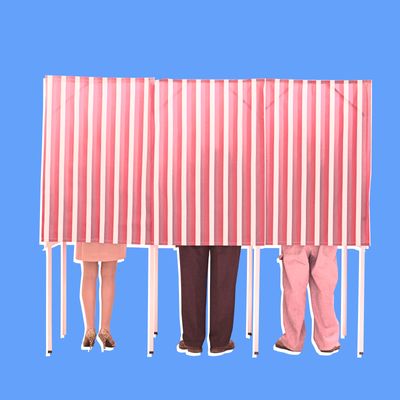
The United States trails far behind many democracies in voter turnout. In 2016, the U.S. saw 55.7 percent of its voting-age population at the poll booth for the presidential election. Compare that to France, to give just one example, which saw a 67.9 percent voter-participation rate for its presidential election in May. Many factors influence voter turnout, of course, from chance occurrences like bad weather to systemic issues such as too few polling locations or the lack of automatic voter registration. But new evidence suggests a surprisingly effective way to address the problem: When children develop certain social skills, they’re more likely to vote when they’re older.
That’s according to a study published in the American Political Science Review in June, and the findings were surprising, even to the researchers. The study, led by John Holbein, an assistant professor of political science of Brigham Young University, focused on a program called Fast Track, which was designed to improve the future general well-being of children by developing their social skills. In total, 891 kids — 445 in the control group, 446 to receive special education on their social skills — who were at risk of growing up to drop out of school, engage in criminal behavior, or be more likely to end up in prison, were in the program in schools across four states: North Carolina, Tennessee, Pennsylvania, and Washington. Fast Track lasted from the first grade to the tenth.
By the time they reached adulthood, the kids that had received help in progressing their social skills were better off than those who hadn’t. They were less likely to commit crimes or to be involved with risky sexual behavior, and they were more likely to be better educated and have better employment prospects, as well as have healthier relationships with their spouses and children.
Fast Track wasn’t intended to have an impact on the kids’ later likelihood to vote, and yet that’s what emerged from the data: The kids who had been taught to develop their social skills tended to vote more often than their peers in the control group. Because Fast Track kept information about the children beyond the tenth grade, Holbein was able to match individuals with state voter files, and thus see how often they voted.
It’s hard to say which part or parts of Fast Track caused the 7.3 percent rise in voter turnout for adults who received the specific education on social skills compared to the control group, but Holbein has a few theories.
Fast Track helped children learn to empathize. “[T]here are people experiencing various things in their lives: various hardships, various difficulties, various obstacles in their lives. [Fast Track] gave [kids] the ability to see that and say, ‘Okay, what am I going to do about that?’” said Holbein in an interview with Science of Us. One way Fast Track facilitated empathy was through a component called “friendship groups.” In these groups of six, a trained adult would help children identify their feelings and point them out to the other children.
It also taught kids how to better control their actions. Voting takes effort: In many cases, you have to first register, walk or drive to your polling place, wait in line, and set aside time to do all of this. This takes a certain amount of willpower and effort to do.
“I think Fast Track taught kids the self-control abilities to be able to, when distractions or difficulties arise, continue to persevere and follow through their intentions to participate,” said Holbein. One task Fast Track had children engage in was called the stoplight exercise. Kids were taught that if they had a problem, or they were unhappy, then they should stop (red); take a breath, calm down, and think of what they could do about how they felt (yellow, the thinking light); and then when they have a solution, act on it (green), or go back to the red light.
A cumulative effect of the Fast Track program meant more kids being allowed to vote when they grew older. “It helped them avoid some of the negative life events that we know make it less likely for individuals to vote,” Holbein said. Due to various laws regarding felons in states, many who have been to jail aren’t allowed to vote even after they have served their sentence.
No matter how Holbein sliced it, the data showed that kids who received the Fast Track program’s emphasis on advancing their social skills were more likely to vote. A straight comparison between the two groups in the Fast Track program, that is, one that didn’t account for various individual factors, yielded a difference in turnout of 6.6 percent. The difference increased to 7.3 percent, mentioned previously, when accounting for circumstances like age, sex, and race.
It’s a relatively small difference, true, and yet it’s still substantial. Given this, it’s worth wondering if parents can do anything to help foster their children’s social skills that might lead them to vote when they get older. “In many cases, parents do teach their children [social] skills — however, in some ways, it’s like helping a child learn to read,” said Kenneth Dodge, a professor of public policy and psychology at Duke University who has been involved with the Fast Track program. “Parents could help their child learn to read. They could do what a classroom teacher does in reading to a child, and teaching the phonics, and teaching different reading skills, and help the child learn to read. And many parents do that, of course. However, there is something professional and systematic about teaching a child to read that a classroom teacher does that most parents are grateful for and don’t do.”
But even if this type of emphasis on social skills were to become standard for schools in every state, it wouldn’t be a cure-all for low voter turnout in the U.S. For one, it’s unknown how much laws, like voter-ID laws, would hamper the benefits of this type of education on children. It’s also unknown how much the benefits of social-skill teaching might be diluted by other voting reforms such as same-day registration. That being said, because helping children develop their social skills would be a nonpolitical process with no specific partisan goals, it might be one of the easiest to implement in any state.




